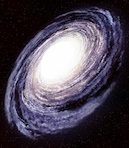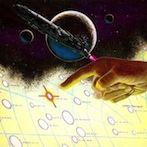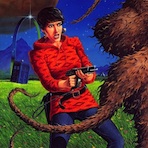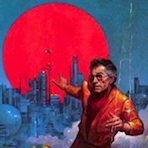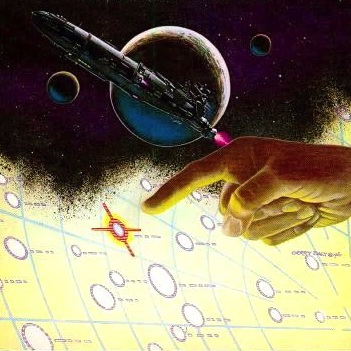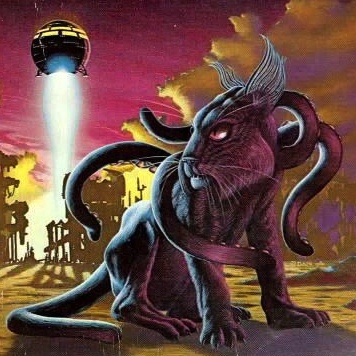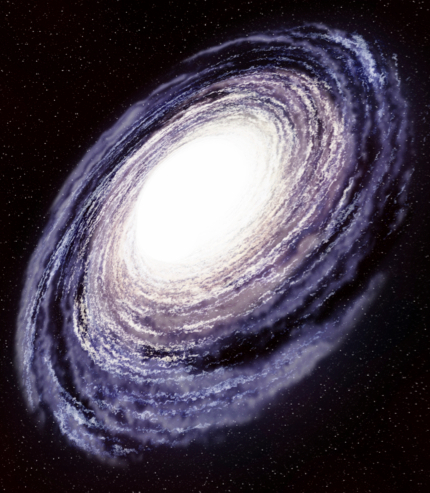Why read van Vogt today, one hundred years after his date of birth (1912) and seventy years after his creative period (1939-1951)? The answer is complex, but I think it can be explained in not too many words.
Because he could give substance to his era's fears, with an original linguistic elaboration. The alien monsters are humanized because they are viewed subjectively. In his best works, we live in an atmosphere similar to the noir movies of the 40's (Jameson). Sinister shadows haunt our future, but they can be beaten with our mutual collaboration and our knowledge of history. Van succeeded in giving form to aliens physically monstrous, but not always hostile. He could easily bring us into his hallucinatory realities situated between dream and nightmare. In his most lucid moments, van Vogt perceived there were basic defects in the species destined to rule the Sevagram ("Asylum," "Centaurus II").
However, in his universes, the galactic gangsters can be defeated not only by Gosseyn and Crang, but also by Dan Lyttle (an evocative name?)
In the end, maybe using force, the terrifying aliens can become distant and difficult allies.
It is because of this improbable but possible convergence between men and monsters, in which the roles sometimes become interchangeable (Earth's Last Fortress, The Silkie), that I still read van Vogt.
***
Van Vogt, in his small way, was a tragic figure. In the 40's, he could fascinate a generation of readers with the representation of a hostile and dark universe, which can be controlled by men, with some cleverness but also with strange alliances with aliens (in the end, also with the man-eating Rulls).
But, in 1950 he had a frightful incident which ruined his writing career and probably his life: he listened to Ron Hubbard.
I think we can surely say that auditing is a very dangerous activity capable of damaging your rational thinking, as well as that of your "patients." Van Vogt was occupied in this insane practice for more than ten years. Because he wanted to continue to be a writer, he largely used the fixup technique. They soon became too many and also became more irrelevant and silly ones.
***
Slan today is inadequate in all the parts written from a female point of view (in particular the ludicrous Chapter 8), but, as an apologue against racism, narrated with haunting scenery, it is surprisingly fresh and is still valid today. The ending is that of a fairy tale, but this is his first novel...
I don't like much The Weapon Makers. In it there are the No-Men and the enigmatic spiders but we find also a conceited and obsessed immortal who is incestuous for seven thousand years: it is not strange that Innelda Isher has some character problems...
The Book of Ptath, instead, is one of my favorites. It's a dream of women and power: this time, an astute fairy tale. We are mostly a fan of Ineznia (a goddess who makes love with no problems), but you can't have it all... The prayer's staffs are a great invention.
The World of Null-A: the Astounding version is very exciting, but brainless. The 1948 revised edition is for me Van's masterwork: a universe perpetually changing (or mutating?), full of accelerated speed, in a frame which encompasses two galaxies, two million years, the Games Machine, the fascinating and menacing Patricia Hardie, a future philosophy and a band of gangsters in the pay of an hostile stellar empire...
The sequel, The Players of Null-A, is interesting, but too slow. Secoh is formidable, the Sleeping God is a breathtaking concept, Leij is seductive but badly used, and then? Then little. To introduce in the distance a cruel galactic empire is good: to show it in detail reveals the cardboard scenery. Enro/Nero is a involuntary comic figure.
The Voyage of the Space Beagle is the first fixup. A good book, but I prefer the original short stories. In the novel the nexialist is featured too much, and it presents a rather menacing interpretation of democracy.
I knowingly omit The Wizard of Linn and The Shadow Men, two minor novels (the second has a splendid beginning, which quickly comes to nothing).
The House that Stood Still is a curious experiment at writing a hard-boiled novel in an SF background. It's very original: in 1950 Van is searching for new ways, but Ron Hubbard will block out everything else.
The Weapon Shops is for me the single fixup which is better than the short stories they're created from. The structure of the book is grandiose and Hedrock is not always center stage...
***
It's not necessary to speak of the many novels of the second period. When Van returned to write systematically, a lot of fans remembered him, but the extended use of fixups, which he explained in purely commercial terms, was like a boomerang for his career. After four or five disappointing and old-fashioned books, Van was nearly forgotten. In this period he produced some interesting short stories and novellas such as "The Silkie," "The Replicators," "Research Alpha" with Schmitz, "The Proxy Intelligence," "The Rat and the Snake," "Ersatz Eternal," "The Human Operators" with Ellison, "Identity," "Footprint Farm," "Death Talk" and "The Brain," but for the twenty-five years of his second career this is not much.
***
Shattering blows against van Vogt include the 1967 edition of In Search of Wonder by Damon Knight, which trashes van Vogt and was widely read by SF authors; the novel Herovit's World by Malzberg in which Van is painted as a drunkard; the death in 1975 of his first wife, Mayne; and, finally, succumbing to Alzheimer's disease.
Fortunately, near the end of his rational life, he met a caring and loving woman, Lydia. His last novels, if not masterpieces, are at least ironic and smiling books. These — which I call the Lydia books — are Cosmic Encounter, Computerworld, To Conquer Kiber (still unpublished in English!) and Null-A Three. They can be read with some excitement and amusement, but none of them are actually in print.
Will the future remember van Vogt? I think the answer is yes, but only for the first thirteen years of his career, in which he was the precise and evocative mirror of a violent and unruly period.
